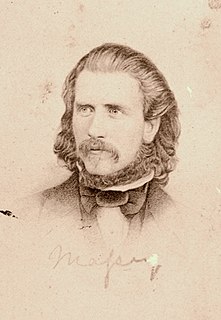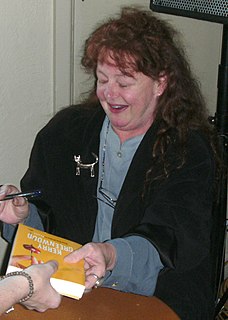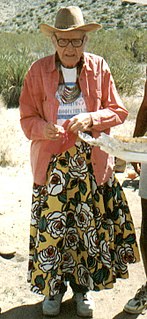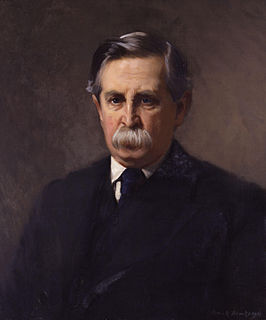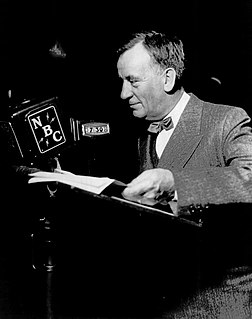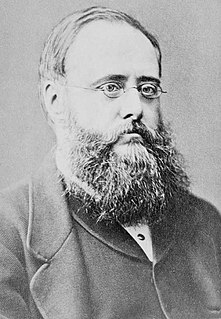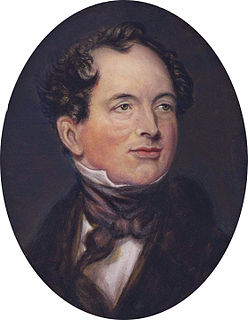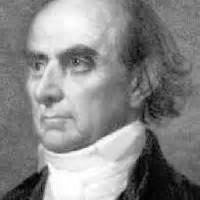Top 970 Tis Quotes & Sayings - Page 16
Explore popular Tis quotes.
Last updated on November 27, 2024.
The slaving Poor are incapable of any Principles: Gentlemen may be converted to true Principles, by Time and Experience. The middling Rank of Men have Curiosity and Knowledge enough to form Principles, but not enough to form true ones, or correct any Prejudices that they may have imbib'd: And 'tis among the middling Rank, that Tory Principles do at present prevail most in England.
Culture implies all which gives the mind possession of its own powers, as languages to the critic, telescope to the astronomer. Culture alters the political status of an individual. It raises a rival royalty in a monarchy. 'Tis king against king. It is ever a romance of history in all dynasties--the co-presence of the revolutionary force in intellect. It creates a personal independence which the monarch cannot look down, and to which he must often succumb.
The perfect church service would be the one we were almost unaware of; our attention would have been on God. But every novelty prevents this. It fixes our attention on the service itself; and thinking about worship is a different thing than worshipping ... 'Tis mad idolatry that makes the service greater than the god.
You got rid of them. Yes, that’s just like you. Getting rid of everything unpleasant instead of learning to put up with it. Whether ‘tis better in the mind to suffer the slings and arrows of outrageous fortune, or to take arms against a sea of troubles and by opposing end them… But you don’t do either. Neither suffer nor oppose. You just abolish the slings and arrows. It’s too easy.
The harder the conflict, the more glorious the triumph. What we obtain too cheap, we esteem too lightly; it is dearness only that gives everything its value. I love the man that can smile in trouble, that can gather strength from distress and grow brave by reflection. 'Tis the business of little minds to shrink; but he whose heart is firm, and whose conscience approves his conduct, will pursue his principles unto death.
Come, my Celia, let us prove, While we can, the sports of love, Time will not be ours for ever, He, at length, our good will sever; Spend not then his gifts in vain: Suns that set may rise again; But if once we lose this light, 'Tis with us perpetual night. Why should we defer our joys? Fame and rumour are but toys.
Be strong: we are not here to play, to dream, to drift, we have hard work to do and loads to lift, shun not the struggle, face it, 'tis god's gift. Be strong: say not the days are evil - who's to blame! And fold your hands and acquiesce - o shame! Stand up, speak out, and bravely in god's name. Be strong! It matters not how deep entrenched the wrong. How hard the battle goes, the day, how long! Faint not, fight on! Tomorrow comes the song.
Your corn is ripe today, mine will be so tomorrow. 'Tis profitable for us both that I should labor with you today, and that you should aid me tomorrow. I have no kindness for you, and know you have as little for me. I will not, therefore, take any pains upon your account . . . Here then I leave you to labor alone; you treat me in the same manner. The seasons change, and both of us lose our harvests for want of mutual confidence and security.
O, that this too too solid flesh would melt Thaw and resolve itself into a dew! Or that the Everlasting had not fix'd His canon 'gainst self-slaughter! O God! God! How weary, stale, flat and unprofitable, (135) Seem to me all the uses of this world! Fie on't! ah fie! 'tis an unweeded garden, That grows to seed; things rank and gross in nature Possess it merely. That it should come to this! But two months dead: nay, not so much, not two: (140) So excellent a king; that was, to this.
For chemistry is no science form'd à priori; 'tis no production of the human mind, framed by reasoning and deduction: it took its rise from a number of experiments casually made, without any expectation of what follow'd; and was only reduced into an art or system, by collecting and comparing the effects of such unpremeditated experiments, and observing the uniform tendency thereof. So far, then, as a number of experimenters agree to establish any undoubted truth; so far they may be consider'd as constituting the theory of chemistry.
It is not politic in the commonwealth of nature to preserve virginity. Loss of virginity is rational increase, and there was never virgin got till virginity was first lost. That you were made of is metal to make virgins. Virginity, by being once lost, may be ten times found: by being ever kept, it is ever lost. ’Tis too cold a companion: away with ’t!
Through primrose tufts, in that green bower,
The periwinkle trails its wreath;
And 'tis my faith that every flower
Enjoys the air it breathes.
The birds around me hopped and played,
Their thoughts I cannot measure;
But the least motion which they made,
It seemed a thrill of pleasure.
The budding twigs spread out their fan,
To catch the breezy air;
And I must think, do all I can
That there was pleasure there.
If this belief from heaven be sent,
If such be Nature's holy plan,
Have I not reason to lament
What man has made of man?
My dear fellow,' Burlingame said, 'we sit here on a blind rock careening through space; we are all of us rushing headlong to the grave. Think you the worms will care, when anon they make a meal of you, whether you spent your moment sighing wigless in your chamber, or sacked the golden towns of Montezuma? Lookee, the day's nigh spent; 'tis gone careening into time forever. Not a tale's length past we lined our bowels with dinner, and already they growl for more. We are dying men, Ebenezer: i'faith, there's time for naught but bold resolves!
Solitude is the surest nurse of all prurient passions, and a girl in the hurry of preparation, or tumult of gaiety, has neither inclination nor leisure to let tender expressions soften or sink into her heart. The ball, the show, are not the dangerous places: no, 'tis the private friend, the kind consoler, the companion of the easy vacant hour, whose compliance with her opinions can flatter her vanity, and whose conversation can sooth, without ever stretching her mind, that is the lover to be feared: he who buzzes in her ear at court, or at the opera, must be contented to buzz in vain.
There is an inconvenience which attends all abstruse reasoning. that it may silence, without convincing an antagonist, and requires the same intense study to make us sensible of its force, that was at first requisite for its invention. When we leave our closet, and engage in the common affairs of life, its conclusions seem to vanish, like the phantoms of the night on the appearance of the morning; and 'tis difficult for us to retain even that conviction, which we had attain'd with difficulty.
Tis evident that all reasonings concerning matter of fact are founded on the relation of cause and effect, and that we can never infer the existence of one object from another, unless they be connected together, either mediately or immediately... Here is a billiard ball lying on the table, and another ball moving toward it with rapidity. They strike; and the ball which was formerly at rest now acquires a motion. This is as perfect an instance of the relation of cause and effect as any which we know, either by sensation or reflection.
To consider the matter aright, reason is nothing but a wonderful and unintelligible instinct in our souls, which carries us along a certain train of ideas, and endows them with particular qualities, according to their particular situations and relations. This instinct, 'tis true, arises from past observation and experience; but can anyone give the ultimate reason, why past experience and observation produces such an effect, any more than why nature alone should produce it?
I envy not in any moods The captive void of noble rage, The linnet born within the cage, That never knew the summer woods: I envy not the beast that takes His license in the field of time, Unfetter’d by the sense of crime, To whom a conscience never wakes; Nor, what may count itself as blest, The heart that never plighted troth But stagnates in the weeds of sloth; Nor any want-begotten rest. I hold it true, whate’er befall; I feel it, when I sorrow most; ‘Tis better to have loved and lost Than never to have loved at all.
True Love in this differs from gold and clay,
That to divide is not to take away.
Love is like understanding, that grows bright,
Gazing on many truths; 'tis like thy light,
Imagination! which from earth and sky,
And from the depths of human phantasy,
As from a thousand prisms and mirrors, fills
The Universe with glorious beams, and kills
Error, the worm, with many a sun-like arrow
Of its reverberated lightning.
Seems," madam? Nay, it is; I know not "seems." 'Tis not alone my inky cloak, good mother, Nor customary suits of solemn black, Nor windy suspiration of forced breath, No, nor the fruitful river in the eye, Nor the dejected 'havior of the visage, Together with all forms, moods, shapes of grief, That can denote me truly: these indeed seem, For they are actions that a man might play: But I have that within which passeth show; These but the trappings and the suits of woe.
Because I could not stop for Death, He kindly stopped for me; The carriage held but just ourselves And Immortality. We slowly drove, he knew no haste, And I had put away My labour, and my leisure too, For his civility. We passed the school where children played, Their lessons scarcely done; We passed the fields of gazing grain, We passed the setting sun. We paused before a house that seemed A swelling of the ground; The roof was scarcely visible, The cornice but a mound. Since then 'tis centuries; but each Feels shorter than the day I first surmised the horses' heads Were toward eternity.
And then he drew a dial from his poke, And looking with lack-lustre eye, Says very wisely, 'It is ten o'clock: Thus we may see', Quoth he, 'how the world wags: 'Tis but an hour ago since it was nine, And after one hour more 'twill be eleven; And so from hour to hour we ripe and ripe, And then from hour to hour we rot and rot.
And they need not cause you grief. As my Highland grandmother said-and she had the Sight-Tis not the dead ye have to be concerned about! Beware of the Living! And she was a wise woman. The dead are beyond your help or mine, poor things. But the living need us. Thirty souls at the least, Phryne, are still on that island to praise God who might now be angels-or devils.
Mock on, mock on, Voltaire, Rousseau! Mock on, mock on: 'Tis all in vain! You throw the sand against the wind, And the wind blows it back again. And every sand becomes a gem Reflected in the beams divine; Blown back they blind the mocking eye, But still in Israel's paths they shine. The atoms of Democritus And Newton's particles of light Are sands upon the Red Sea shore, Where Israel's tents do shine so bright.
The Commonwealth of Learning is not at this time without Master-Builders, whose mighty Designs, in advancing the Sciences, will leave lasting Monuments to the Admiration of Posterity; But every one must not hope to be a Boyle, or a Sydenham; and in an Age that produces such Masters, as the Great-Huygenius, and the incomparable Mr. Newton, with some other of that Strain; 'tis Ambition enough to be employed as an Under-Labourer in clearing Ground a little, and removing some of the Rubbish, that lies in the way to Knowledge.
Out of the mists of our long oppression, / We bring love for ourselves and each other, / And love for the gifts we bear, /So heavy and so painful the fashioning of them, /So long the road given us to travel them. A separate people, /We bring a gift to celebrate each other, /’Tis a gift to be gay! / Feel the pride of it!
When I am assailed with heavy tribulations, I rush out among my pigs rather than remain alone by myself. The human heart is like a millstone in a mill: when you put wheat under it, it turns and grinds and bruises the wheat to flour; if you put no wheat, it still grinds on, but then 'tis itself it grinds and wears away. So the human heart, unless it be occupied with some employment, leaves space for the devil, who wriggles himself in and brings with him a whole host of evil thoughts, temptations, and tribulations, which grind out the heart.
What's more to do,
Which would be planted newly with the time,
As calling home our exiled friends abroad
That fled the snares of watchful tyranny,
Producing forth the cruel ministers
Of this dead butcher and his fiend-like queen,
Who, as 'tis thought, by self and violent hands
Took off her life; this, and what needful else
That calls upon us, by the grace of Grace
We will perform in measure, time, and place.
I had wished to find in philosophy and religion a remedy for my disgrace; I searched out an asylum to secure me from love... duty, reason and decency, which upon other occasions have some power over me, are here useless. The Gospel is a language I do not understand when it opposes my passion... but when love has once been sincere how difficult it is to determine to love no more! 'Tis a thousand times more easy to renounce the world than love. I hate this deceitful, faithless world; I think no more of it.
And the silken sad uncertain rustling of each purple curtain Thrilled me — filled me with fantastic terrors never felt before; So that now, to still the beating of my heart, I stood repeating, Tis some visitor entreating entrance at my chamber door — Some late visitor entreating entrance at my chamber door; — This it is, and nothing more.
My chief time for reading is at night while brushing my hair before I go to bed, and as you may suppose, but little profit and pleasure can be derived from such mere sips at the well of knowledge. 'Tis a great privation to me, for my desire for information increases instead of diminishing, and I look forward with great anxiety to the time when I can improve my poor neglected mind and learn some of the few exhaustless store of things which I wish to know.
O, Times! O, Manners! It is my opinion That you are changing sadly your dominion I mean the reign of manners hath long ceased, For men have none at all, or bad at least; And as for times, altho' 'tis said by many The "good old times" were far the worst of any, Of which sound Doctrine I believe each tittle Yet still I think these worst a little. I've been a thinking -isn't that the phrase?- I like your Yankee words and Yankee ways - I've been a thinking, whether it were best To Take things seriously, Or all in jest
O Mistress mine, where are you roaming? O, stay and hear; your true love's coming, That can sing both high and low: Trip no further, pretty sweeting; Journeys end in lovers meeting, Every wise man's son doth know. What is love? 'Tis not hereafter; Present mirth hath present laughter; What's to come is still unsure: In delay there lies not plenty; Then, come kiss me, sweet and twenty, Youth's a stuff will not endure.
tis woman's strongest vindication for speaking that the world needs to hear her voice. It would be subversive of every human interest that the cry of one-half the human family be stifled. ... The world has had to limp along with the wobbling gait and one-sided hesitancy of a man with one eye. Suddenly the bandage is removed from the other eye and the whole body is filled with light. It sees a circle where before it saw a segment. The darkened eye restored, every member rejoices with it.
Lysistrata: Oh, Calonicé, my heart is on fire; I blush for our sex. Men will have it we are tricky and sly...Calonicé: And they are quite right, upon my word!Lysistrata: Yet, look you, when the women are summoned to meet for a matter of the last importance, they lie abed instead of coming.Calonicé: Oh, they will come, my dear; but 'tis not easy you know, for a woman to leave the house. One is busy pottering about her husband; another is getting the servant up; a third is putting her child asleep or washing the brat or feeding it.
Who does his task from day to day and meets whatever comes his way, Believing God has willed it so, has found real greatness here below. Who guards his post, no matter where, believing God must need him there, Although but lowly toil it be, has risen to nobility. For great and low there's just one test, 'tis that each man shall do his best, Who works with all the strength he can, shall never die in debt to man.
'Tis sorrow builds the shining ladder up, Whose golden rounds are our calamities, Whereon our firm feet planting, nearer God The spirit climbs, and hath its eyes unsealed. True it is that Death's face seems stern and cold When he is sent to summon those we love; But all God's angels come to us disguised; Sorrow and sickness, poverty and death, One after another, lift their frowning masks, And we behold the Seraph's face beneath, All radiant with the Glory and the calm Of having looked upon the front of God.
Journey’s end In western lands beneath the Sun The flowers may rise in Spring, The trees may bud, the waters run, The merry finches sing. Or there maybe 'tis cloudless night, And swaying branches bear The Elven-stars as jewels white Amid their branching hair. Though here at journey's end I lie In darkness buried deep, Beyond all towers strong and high, Beyond all mountains steep, Above all shadows rides the Sun And Stars for ever dwell: I will not say the Day is done, Nor bid the Stars farewell.J.
How I like claret!...It fills one's mouth with a gushing freshness, then goes down to cool and feverless; then, you do not feel it quarrelling with one's liver. No; 'tis rather a peace-maker, and lies as quiet as it did in the grape. Then it is as fragrant as the Queen Bee, and the more ethereal part mounts into the brain, not assaulting the cerebral apartments, like a bully looking for his trull, and hurrying from door to door, bouncing against the wainscott, but rather walks like Aladdin about his enchanted palace, so gently that you do not feel his step.
The young May moon is beaming, love.
The glow-worm's lamp is gleaming, love.
How sweet to rove,
Through Morna's grove,
When the drowsy world is dreaming, love!
Then awake! - the heavens look bright, my dear,
'Tis never too late for delight, my dear,
And the best of all ways
To lengthen our days
Is to steal a few hours from the night, my dear!
I myself have loved a lady and pursued her with a great deal of under-age protestation, whom some three or four gallants that have enjoyed would with all their hearts have been glad to have been rid of. 'Tis just like a summer birdcage in a garden: the birds that are without despair to get in, and the birds that are within despair and are in a consumption for fear they shall never get out.
And new philosophy calls all in doubt, The element of fire is quite put out; The sun is lost, and the earth, and no man's wit Can well direct him where to look for it. And freely men confess that this world's spent, When in the planets, and the firmament They seek so many new; then see that this Is crumbled out again to his atomies. 'Tis all in pieces, all coherence gone; All just supply, and all relation: Prince, subject, Father, Son, are things forgot.
Praise and Prayer PRAISE is devotion fit for mighty minds, The diff'ring world's agreeing sacrifice; Where Heaven divided faiths united finds: But Prayer in various discord upward flies. For Prayer the ocean is where diversely Men steer their course, each to a sev'ral coast; Where all our interests so discordant be That half beg winds by which the rest are lost. By Penitence when we ourselves forsake, 'Tis but in wise design on piteous Heaven; In Praise we nobly give what God may take, And are, without a beggar's blush, forgiven.
'Tis a short sight to limit our faith in laws to those of gravity, of chemistry, of botany, and so forth. Those laws do not stop where our eyes lose them, but push the same geometry and chemistry up into the invisible plane of social and rational life, so that, look where we will, in a boy's game, or in the strifes of races, a perfect reaction, a perpetual judgment keeps watch and ward.
Every Man being conscious to himself, That he thinks, and that which his Mind is employ'd about whilst thinking, being the Ideas, that are there, 'tis past doubt, that Men have in their Minds several Ideas, such as are those expressed by the words, Whiteness, Hardness, Sweetness, Thinking, Motion, Man, Elephant, Army, Drunkenness, and others: It is in the first place then to be inquired, How he comes by them? I know it is a received Doctrine, That Men have native Ideas, and original Characters stamped upon their Minds, in their very first Being.
Why, if 'tis dancing you would be, There's brisker pipes than poetry. Say, for what were hop-yards meant, Or why was Burton built on Trent? Oh many a peer of England brews Livelier liquor than the Muse, And malt does more than Milton can To justify God's ways to man. Ale, man, ale's the stuff to drink For fellows whom it hurts to think: Look into the pewter pot To see the world as the world's not.
Tis a Mistake to think this Fault [tyranny] is proper only to Monarchies; other Forms of Government are liable to it, as well as that. For where-ever the Power that is put in any hands for the Government of the People, and the Preservation of their Properties, is applied to other ends, and made use of to impoverish, harass, or subdue them to the Arbitrary and Irregular Commands of those that have it: There it presently becomes Tyranny, whether those that thus use it are one or many.
My Faith is larger than the Hills— So when the Hills decay— My Faith must take the Purple Wheel To show the Sun the way— 'Tis first He steps upon the Vane— And then — upon the Hill— And then abroad the World He go To do His Golden Will— And if His Yellow feet should miss— The Bird would not arise— The Flowers would slumber on their Stems— No Bells have Paradise— How dare I, therefore, stint a faith On which so vast depends— Lest Firmament should fail for me— The Rivet in the Bands
Once upon a midnight dreary, while I pondered, weak and weary, Over many a quaint and curious volume of forgotten lore--While I nodded, nearly napping, suddenly there came a tapping, As if some one gently rapping, rapping at my chamber door. "'Tis some visitor," I muttered, "tapping at my chamber door--Only this and nothing more.
King Henry: But what a point, my lord, your falcon made, And what a pitch she flew above the rest! To see how God in all his creatures works! Yea, man and birds are fain of climbing high. Suffolk: No marvel, an it like your majesty, My lord protectors hawks do tower so well; They know their masters loves to be aloft, And bears his thoughts above his falcon's pitch. Gloucester: My lord, 'tis but a base ignoble mind That mounts no higher than a bird can soar.
When winds are raging o'er the upper ocean And billows wild contend with angry roar, 'Tis said, far down beneath the wild commotion That peaceful stillness reigneth evermore. Far, far beneath, the noise of tempests dieth And silver waves chime ever peacefully, And no rude storm, how fierce soe'er it flyeth Disturbs the Sabbath of that deeper sea.
SHE is neither pink nor pale, And she never will be all mine; She learned her hands in a fairy-tale, And her mouth on a valentine. She has more hair than she needs; In the sun ’tis a woe to me! And her voice is a string of colored beads, Or steps leading into the sea. She loves me all that she can, And her ways to my ways resign; But she was not made for any man, And she never will be all mine.
















